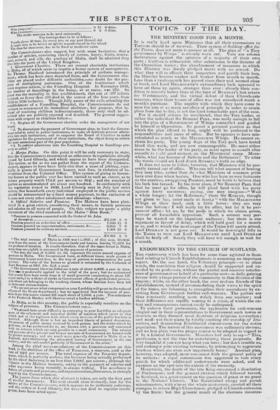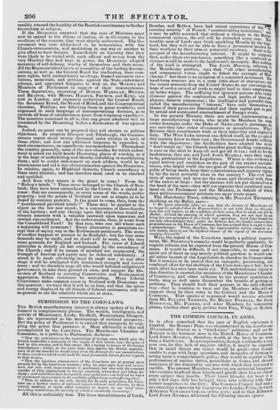ENDOWMENTS TO THE CHURCH OF SCOTLAND.
THE controversy which has been for some time agitated in Scot- land relating to Church Establishments is assuming an important aspect. On the one hand, the Voluntary principle—or in other words, the conviction that religion should be supported and ex- tended by its professors, without the partial and coercive interfer- ence of government on behalf of a particular sect—is daily gaining favour with a large portion of the community in that division of the empire; while, on the other hand, the over zealous friends of the Establishment, instead of accommodating their views to the spirit of the times, are labouring to strengthen their ascendancy by ex- torting from Government further endowments. The parties are thus constantly receding more widely from one another ; and their differences are rapidly coming to a crisis, of which the ex- tent and consequences cannot easily be anticipated.
To enforce their pretensions, the applicants for endowments singled out in their representations to Goverument such towns or districts as they deemed most destitute of' religious iiietruction ; and made out their claim by totally omitting the worship of Dis- senters, and demanding Established church-room for the entire population. The nature of this tuovetneut was sufficiently obvious; and no less plain was the proper course to be adopted in regard to it by a Liberal Government. Ministers had only to say—" This, gentlemen, is not the time for entertaining these proposals. Be very thankful if you can keep what yuu have; but don't trouble us, and endanger your existing revenues, by attempting to aggravate burdens which are even now impatiently borne." Another plan, however, was adopted, more consonant with the general policy of its authors: a royal commission was appointed to visit every parish for which additional endowments were asked, and to examine on the spot into the extent of the necessity. Meanwhile, the death of the late King occasioned a dissolution of Parliament ; and the general election which followed turned, in Scotland, to a great extent on the question of grant or no grant to the National Church. The Established clergy and parish schoolmasters, with &must tile whole aristocracy, exerted all their energies to return High Churchmen, pledged to Church-extension by the State: but the general result of the elections incontro-
vertibly attested the hostility of the Scottish constituency to further favouritism in religion.
If the Dissenters supposed that the eyes of' Ministers must now be opened to the claims of justice, or at all events to the condition of the country, they were shortly undeceived. The Go- vernment was soon understood to be temporizing with the Church-extensionists, and meditating in one way or another to give effect to their designs. Immediately on learning that they were likely to be visited with such affront and wrong from the very Ministry they had kept in power, the Dissenters adopted measures of self-defence, worthy of themselves and their cause. All theRepresentativeConrts or assemblies of the leading denomi- nations, as well as the Central Board for vindicating their corn- mon rights, held extraordinary meetingm, framed energetic reso- lutions, memorials, and petitions against the State.endowment scheme, and appointed delegates to wait on the 'Vrinistry and Members of Parliament in support of their remonstrances. These deputations, consisting of Doctors WARDLAW, HEUGH, and BEATTIE, with Messrs. HARPER, FRENCH, and Kusa, are now in London, and represent collectively the Central Board, the Secession Synod, the Synod of Belief, and the Congregational churches. Petitions are following them in great numbers ; and expressed in such language of uncompromising decision, as to exclude all hope of satisfaction or peace from trimming expedielits. The assertion contained in all is, that any grant whatever will be considered by the Dissenting bodies a declaration of war against them.
Indeed, no grant can be proposed that will obviate or palliate objections. As respects Glasgow and Edinburgh, the Commis- sioners report about twenty thousand unlet sittings in each of these cities; and how can additional largesses be expended, in such circumstances, on superfluous accommodation? Throughout the country generally, most of the new churches for which endow- ment is asked are built beside Dissenting places of worship, as if in the hope of underletting and thereby enfeebling or annihilating them ; and to confer endowment on such edifices, would be to countenance and aid a war of extermination against the Dissenters. In relation, again, to Highland districts. Church ascendancy is there most absolute, and has therefore most need to be checked and qualified.
And from what source is the grant to come ? From the "Bishops teinds "? These never belonged to the Church of Scot- land ; they have been surrendered by the Crown for a stated in. come ; they are consequently, in every sense of the words, public properly; and the people of Scotland are not so simple as to be duped by contrary pretexts. Is the grant to come, then, from the " unexhausted parochial teinds ?" These may be applied to the object as the law now stands, by a concurrence of three-fourths of the heritors ; and any change upon this stipulation would pe- rilously interfere with a valuable restraint upon rapacious and restless encroachment. Are the endowments, then, to come from the Consolidated Fund? In that ease, who can tell where such a beginning will terminate ? Every alternative is pernicious ex- cept that of saying nay to the Endowment-petitioners. The scene of conflict happens at present to be Scotland ; but the very same demands may be made, and no doubt will be made, on the very same grounds, for England and Ireland. The cauae of Liberal
principles is already all but overpowered by the ascendancy of the Church ; and if its means of mischief are augmented, the
triumph of freedom and equity may be deferred indefinitely. A stand, to be made effectively, must be made now ; at any after stage it will be attempted with diminished strength and consis-
tency: and we therefore urge all who would befriend enlightened government, to take their ground at once, and support the Dis- senters of Scotland in resisting Conservative and Ecclesiastical aggression, before resistance be unavailing. Many Liberal Churchmen make common cause in Scotland with Dissenters on this question : we trust that it will be so here, and that the union and energy displayed by all friends of Liberal sentiments will be as general as are the interests which are at stake.



























 Previous page
Previous page